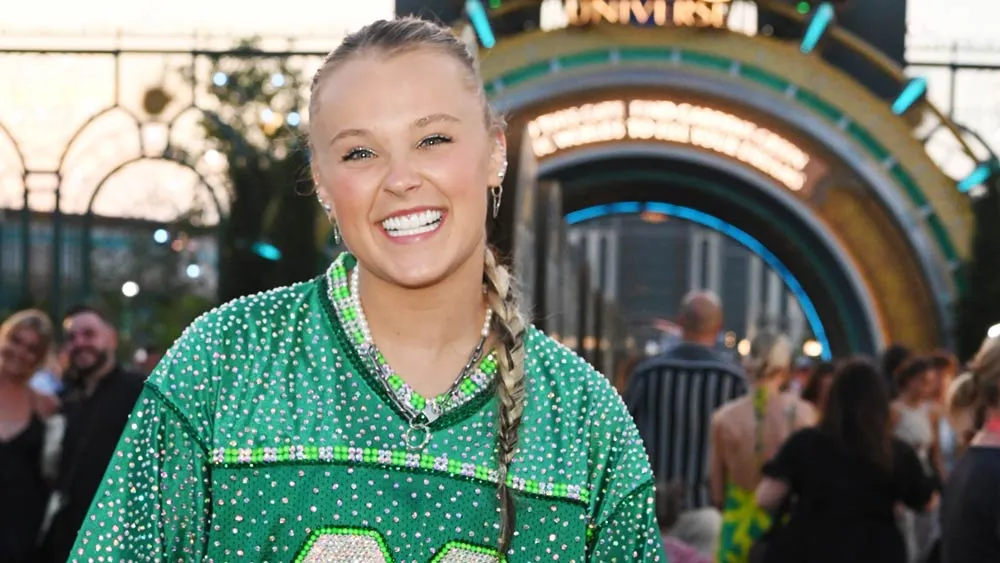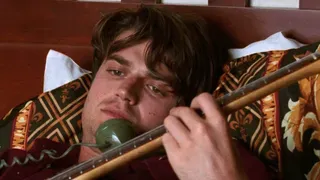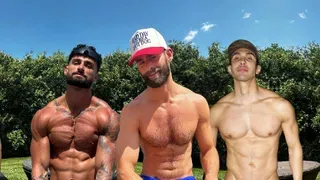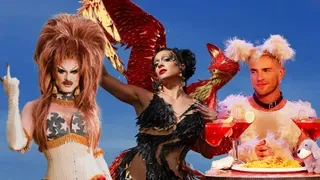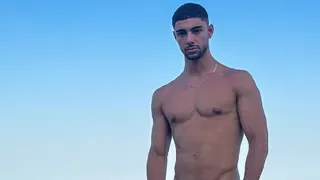February 23, 2021
Differently Abled, Defiantly Sexy: Out Playwright Ryan J. Haddad on His Fearless One Man Show
Kilian Melloy READ TIME: 13 MIN.
One thing playwright and actor Ryan J. Haddad assures us of early in his one-man show "Hi, Are You Single?" is that he has "a higher sex drive than you."
Once that challenge is made, Haddad goes on to present his case with élan, engaging his audience in a spirited monologue (with occasional audience participation) that tackles questions of ageism, racism, HIV stigmatization, and - more than anything else - ableism. Such are the filters in place in the gay dating scene (any dating scene, for that matter), and Haddad doesn't spare himself a dose of critical examination on the subject.
Haddad has cerebral palsy and uses a walker to get around, as well as wearing leg braces. This presents accessibility challenges, especially when stairs are involved, but an even greater challenge is how people see him... or, rather, do not see him. Though his walker seems to signal to those who are not differently abled that Haddad is courageous and spirited, it also acts to deflect and preempt their sexual interest in him, and Haddad interrogates the reasons for this with unflinching focus, frank language, and a dose of dry humor.
"Hi Are You Single" is a co-production of Wolly Mammoth Theatre Company in Washington, D.C., and iama Theatre Company in Los Angeles, an arrangement made possible by streaming, to which many stage companies have turned during the COVID-19 pandemic.
Haddad spoke with EDGE via Zoom about the production, his stage and television work, and making art - and human connection - in the time of COVID.
EDGE: Your play "Hi, Are You Single?" presents its theme right up front: Differently abled people are sexy, too. Why is it so hard for people to imagine someone with CP, like yourself, as being sexual?
Ryan J. Haddad: If you don't have somebody in your life by either blood or choice who is disabled, your experience of disability is only what you see in the media. And the media would never have you believe that we are viable sexual, hot, erotic humans. Often we are dehumanized; often, we are only seen as vessels for other non-disabled people's inspirations. And that comes down to writing, that comes down to executives making decisions and casting people choosing who is and is not fit to tell certain stories. I hope that the media and theater and film and TV and music and visual arts and poetry – however people take in humanity other than person to person interaction – can just reflect us as more rounded, complex, and complicated individuals.
EDGE: The play includes an anecdote about a go-go boy at a gay bar who helps bridge that gap for everyone present by making you the star of his act, and at that point it's different; people start to see you as hot and desirable.
Ryan J. Haddad: Yes, I do think that it is a matter of seeing, or rather – even the word "seeing" is an ablest term, but it's a matter of being given permission to see a set of people who you have just counted out of your realm of attraction to suddenly be able to see them in a frank sexual situation. And you go, "Oh, I'm kind of turned on, I'm kind of aroused by that. Oh, wow! I never imagined them in that form before. But now that it's been presented to me, I like what I see, and I want to make a connection here."
I don't know that that is the all-in-all, gonna-solve-every-problem kind of answer. It's not a blanket solution. But I think it's a major step.
EDGE: As you've put on this play for years and performed it, and talked to people and had them up on your stage dancing with you, have you found that the quality of attention has shifted toward you?
Ryan J. Haddad: I have found that a lot of people resonate with a lot of what they see in the play and what is presented and how it applies to their lives, even if they are not of the disabled experience or the gay experience. There are universal themes, and questions of rejection and being rejected, and of seeing yourself in a way that's different than the way that the world perceives you, so I think a lot people respond to the play on a personal level on their own. Even if our experiences are not the same, the emotions of what we experience are similar, and do resonate.
I can't say that I've come off stage and had men pawing at me after doing the play and wanting to go back to my hotel room, or what have you. I have sometimes gotten the sense that men who knew me before they saw the play, and then saw the play, have gotten a little cozier and warmed up a bit and started to, you know, be more affectionate than they had been before – maybe because the play gave them permission to do that, I don't know. What hasn't happened is, I don't meet and greet strangers in the lobby and then have one of them be like, "I'll be waiting for you outside" – though that would be a very interesting tale to tell.
I also think I have just gained more confidence as a human being; I am more secure in my self, and in my pursuits, and in the way that I conduct interactions with other men. I still feel like I'm much more confident in my writing and my work than I am in my interpersonal male-male connections. I wish I had a little more confidence and a little less fear of rejection, frankly, but I'm certainly in a much better place than I was when I wrote and performed the play for the first time, almost six years ago. The play has matured, and I have matured with it.
EDGE: You incorporate an anecdote into this performance of something that happened during a previous performance. Is the plays still evolving and morphing for you? Or is it pretty set now?
Ryan J. Haddad: You know, never say never.
[Laughter]
Ryan J. Haddad: We made some big changes and additions for this Woolly Mammoth and IAMA production. There's always something to tweak, or shift, or refine, or add, or take away. We haven't actually done a lot for taking away; we've done cutting for time, so that we can make space for other things, but most of the stories that were there in the beginning are still there.
I know that I will come back to Woolly Mammoth to do it in Washington when the pandemic is over, and I also have aspirations that I have made no secret about – I have not had a production off-Broadway of any of my plays, let alone this one, which is my first, and I really want to bring this to New York. Every time you enter into another production process there's always something to fix or tweak, and so I can't promise that the version that you'll see on the stage with an audience in a year is going to be exactly, word-for-word the same as it is now. But I think that we've put all the building blocks in in place, and it's pretty close to done as a text.
And, I have other solo plays – I have one that is a companion to "Hi, Are You Single?" that I hope that some day they can be done as a pair, kind of in repertory, and that, I think, because that is newer, that kind of gets to pick up where this leaves off and fill with new ideas and new experiences. I have a play called "Dark Disabled Stories," and I have family play called "Good Time Charlie." The themes are similar, but the way that they are presented and the stories that are told are very different, and the tone is different in all of these pieces. Now that I have more work, I'm much more selective about "I want to thrown this into 'Hi, Are You Single?'," because I know there are other places where new material can live without disrupting text that is pretty codified. Though, you know, it's not done until it goes to the printer, and even when it goes to the printer many authors continue to revise, revise, revise. So, I'm not tying myself to a firm yes or no.
EDGE: When creating a play like "Hi, Are You Single?" where do you draw the boundaries as to what you'll share and what you won't?
Ryan J. Haddad: I can't really qualify it. I'm an autobiographical performer, so I love moments and experiences and particularly the ones I can go really funny, or the ones that have a big emotional impact on me are the ones that I go, "Okay, this I'm gonna file away." "This I'm gonna comeback to in six months and try to write it down." At this moment there isn't one that I say, "Well, I would never tell this." It's all about,. "How does it serve the story, and is it relevant?" I'm pretty open, and pretty willing to share, but I'm sure that, in ways I can't imagine right now, in the middle of this interview, there are things that I just automatically recognize as off limits. I just don't know what they are right now.
[Laughter]
EDGE: One of the most poignant moments in the play was when you share a dance with a member of the audience –and, because of COVID, the audience members were mostly people who worked on the production. The man who joined you was the costume designer.
Ryan J. Haddad: And scenic designer. He did both.
EDGE: That's right, he did both. And there's not a sexual or erotic spark, necessarily, but there's a moment of simple human connection – you're both masked, but you're talking, you're looking each other in the eyes, in person, and for those of us stuck as home interacting with the world over a laptop screen or whatever it felt like a real gift.
Ryan J. Haddad: Thank you. I appreciate that. Normally, that [scene] is done with a member of the audience who I've never met; that was not the case this time. I've known Lawrence for a long time, almost seven years. So there was an intimacy, a trust, and a love between us that I do think is communicated in the film. Which all are things that are not exactly guaranteed when it's a stranger from the audience, but at the very least it is a moment of physical touch and intimacy for the character of Ryan to experience, and for the audience to experience. There has to be trust, because if I didn't trust the person to hold me up instead of letting me fall, then the moment wouldn't happen. But as you know from the story that follows the dance, there was a moment when a person could not hold me up, and we made it work.
EDGE: If someone else were going to play Ryan in this one man show you've written, would you want to say "The actor has to have such and such qualities, I want to be sure that he does it right," and have some hand in the casting, or would you say, "The work is out there – it's for actors to interpret as they will?"
Ryan J. Haddad: I don't know yet, and I haven't crossed that bridge. Eventually I do think it will happen when I age out of the play and I'm no longer doing it myself. I would want to make sure that the actor was disabled – probably with cerebral palsy, but I might be flexible. A physical or mobility disability at the very least. And preferably gay or queer. And I also think that my comedy is unique, and it's unique to my voice, and so making sure that it was someone who [matched that]. I don't know, when it's the tenth production without me, how much control I'm gonna have. But I think in the beginning I would want to make sure it was somebody with a real command of comedy, and charm, and charisma, because I think the audience has to fall in love with the character of Ryan, at least as, like, a new dear friend, in the first half of the play in order for the second half of the play to work. But we haven't gotten there yet.
EDGE: This streaming production used several cameras – at least three, maybe four.
Ryan J. Haddad: Three.
EDGE: Did having to be conscious of those camera setups change your performance?
Ryan J. Haddad: No, because the cameras didn't move. We did it twice, two and a half times, so that the cameras would move in between, during the break, and they would pan left to right, but physically there were not cameras rolling in at or me pivoting from side to side while I was doing the show. It was simple in that regard.
The play was directed first and primarily for the stage, and I was told, "We're doing theater on film. So you're doing a play today, you're not doing an on-camera experience." Even though there were moments of direct address there was very little, if any, direct address that was two-camera. So, no, the cameras did not make me compromise the performance in the moment, but, because the audience was small and I was miked, I wasn't trying to project to the back of the house. I gave a slightly more measured, and not as big and broad a performance, as I normally would if we were doing live [theater].
I've acted on television, and so I understand when there's a camera that's close to you, you aren't going to do what you would do on a big stage. I was on a big stage, but I was in close up a lot of the time. And I wouldn't be able to tell you when I was going to be in close up and when not, so I had to just find a middle of the road between the two mediums.
EDGE: Part of your television work has been the part of Andrew Cashman on the Ryan Murphy series "The Politician." Andrew is something of a Machiavellian character. It seems like you're having a lot of fun with that role – how easily did it match to your personality?
Ryan J. Haddad: The dryness and the sarcasm... I never knew that my humor was dry, but again, there's a difference between my humor on stage and my humor on screen. I realized that if I was going smaller, that drive was sort of by natural instinct. [Andrew's] sarcasm is so delicious, and his motives so relatable. He's in love with someone and wants connection, and will do anything he can to get what he wants. Those were all familiar to me. I, of course, understand the human boundaries in terms of human sexuality and interpersonal relationships in a way that Andrew does not, and so when I say I know what I want, then I'm saying I know who I'm attracted to. But if that person doesn't know, I'm not gonna push harder. Whereas, Andrew is told no over and over and over again, and one of his great flaws is he doesn't even register that he's been rejected, or he chooses to completely ignore it. But when I read the sides to the audition I said, "I have to play this. This is just natural as anything I've done, and I think it's a match," and it turned out to be.
EDGE: What else might you be working on that we would see in the next year – or whenever COVID releases its grip on us?
Ryan J. Haddad: You can currently stream "The Politician" on Netflix, and I have handful of other plays in various stages of development that I do hope will find their way to the stage whenever it's safe to return.
"Hi, Are You Single?" streams through Feb. 28. Closed captions and audio description available. For tickets and more information go to the Woolly Mammoth website.
Kilian Melloy serves as EDGE Media Network's Associate Arts Editor and Staff Contributor. His professional memberships include the National Lesbian & Gay Journalists Association, the Boston Online Film Critics Association, The Gay and Lesbian Entertainment Critics Association, and the Boston Theater Critics Association's Elliot Norton Awards Committee.
